One of the newest cancer treatment methods offered at Regional Cancer Care Associates is targeted therapy. For some patients, targeted therapy can drastically improve their outcomes and help them go on to lead happy, healthy lives.
Has your doctor discussed targeted treatment options with you? If so, here’s a quick summary of what it means and how it might come into play with your treatment plan.
Targeted Treatment vs. Non-Targeted Treatment
Targeted treatment is similar to chemotherapy in that both use powerful drugs to kill cancer cells. The difference is that chemotherapy drugs are designed to kill all fast-growing cells inside the body, including healthy cells, like those in your hair roots. By contrast, targeted-therapy drugs are engineered to specifically attack a patient’s cancer cells. Cancer cells are programmed differently than normal cells, and researchers can examine these cells’ inner workings and pinpoint some of the changes that make them different. From there, they’re able to develop treatments targeted to those changes.
Matching Patients to the Right Treatment
Several FDA-approved targeted therapies are available for patients, and more are being tested in clinical trials. However, just because they are available doesn’t mean they will work for every patient. Doctors must perform many tests to understand each patient’s cancer, genes and protein cells. Based on that information, they can select a treatment that is most likely to be successful.
Here’s one example: Two people are diagnosed with colon cancer, but while their type of cancer is the same, their tumors could be caused by different gene changes. After studying these changes, doctors might determine that targeted therapy is a great option for one patient, but not the other.
Another scenario: About a quarter of all breast cancers involve too much of a protein known as human epidermal growth factor receptor 2 (HER2). If a patient is part of that 25% and tests positive for HER2, she then becomes eligible for certain drugs specifically targeted to that protein.
These differences in how cancer develops are why doctors at RCCA study every patient’s cancer individually. We now have the science and technology to give every patient a personalized treatment plan instead of something universal that may be less effective.
Targeted Therapy in Action
Currently, targeted-therapy drugs are used to treat many types of cancer, including cancers of the stomach, bladder, brain, breast, cervix, colon, kidney, blood, head and neck, skin, thyroid, liver, lungs and more. Not all targeted drugs work the same, so the treatment process and side effects may vary. For instance, some targeted drugs are designed to block or turn off chemical signals that tell cancer cells to grow. Other targeted drugs may be designed to change proteins, halt the production of new blood vessels or carry toxins to cancer cells.
In addition, targeted-therapy drugs are usually used in combination with other treatment methods. Your doctor may also recommend surgery, chemotherapy, radiation therapy or hormone therapy depending on your stage of cancer and your overall health, among other factors.
Find Out More
If you’ve been diagnosed with cancer and are looking for the best treatment, make an appointment at Regional Cancer Care Associates. We’ll conduct a thorough evaluation and get treatment started right away. If you are eligible for targeted therapy, your doctor will explain the process and go over possible side effects with you.









